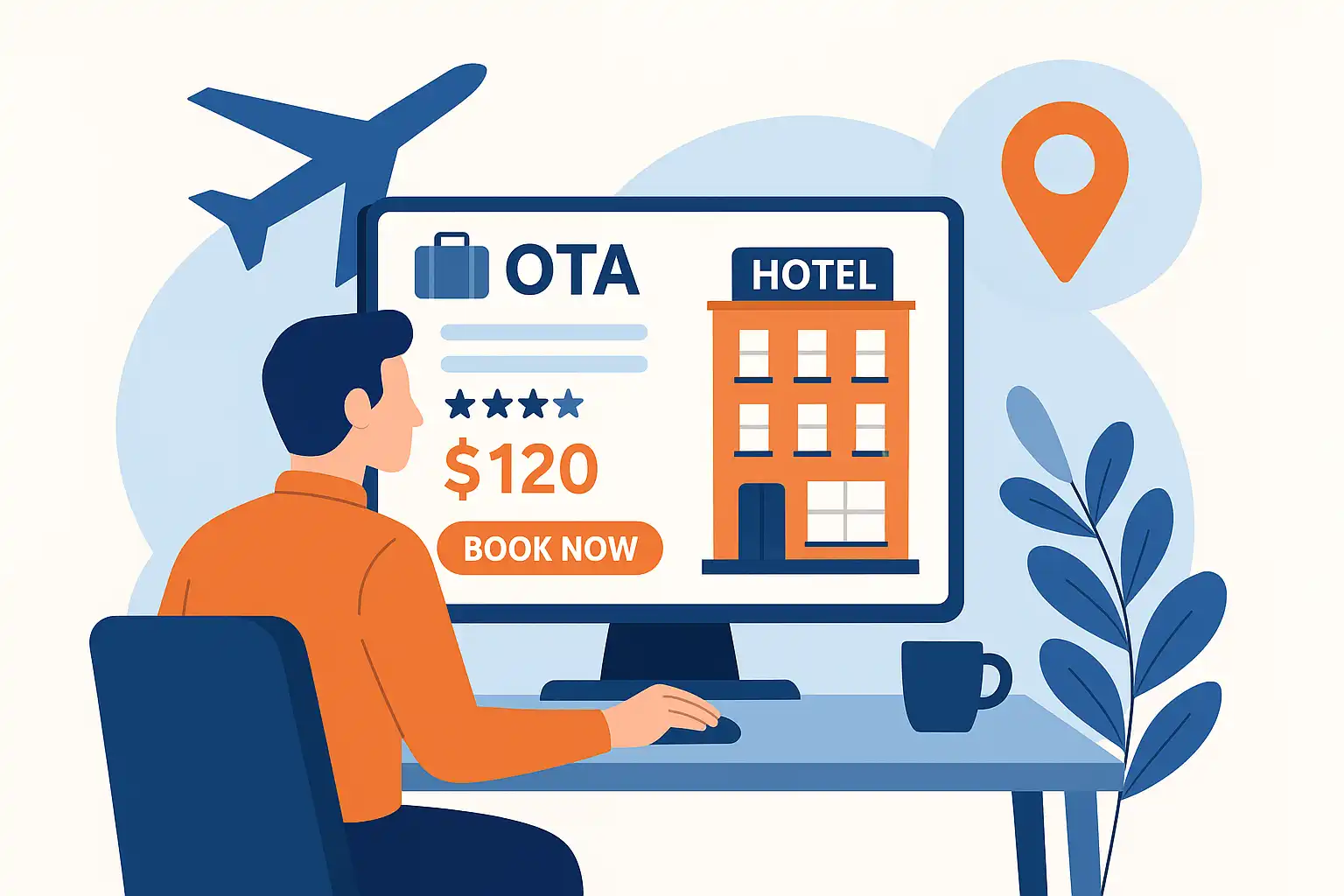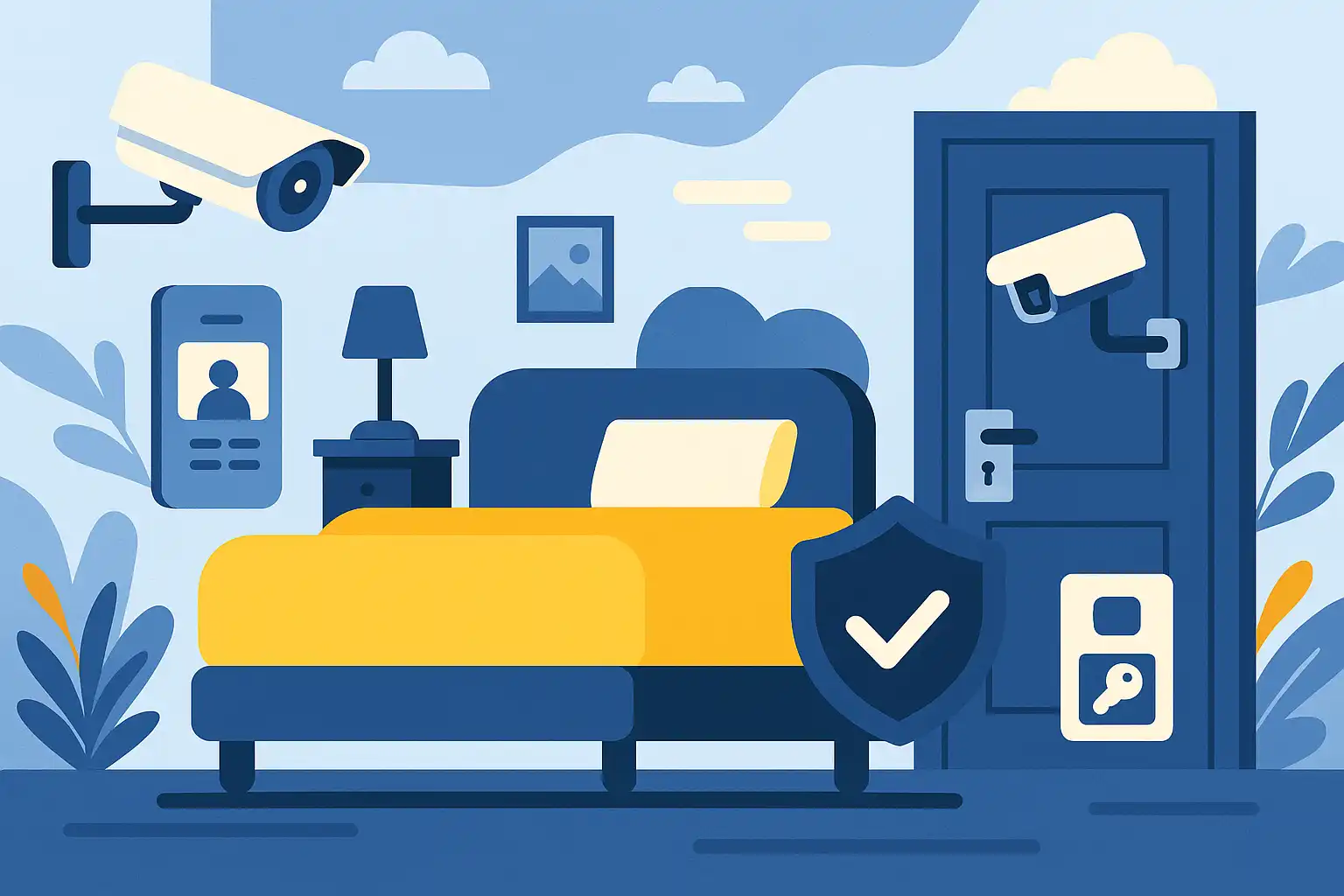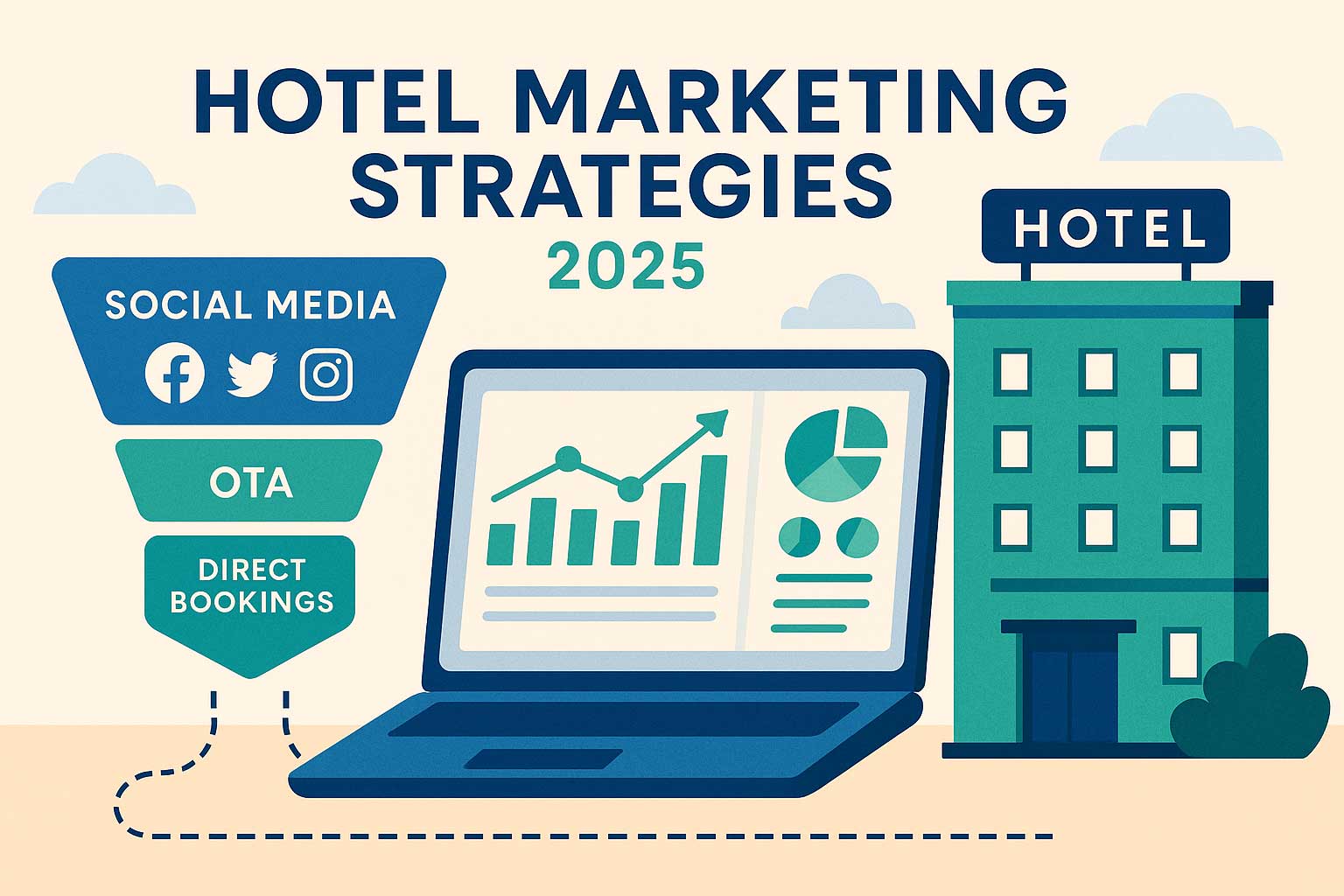Hotel Advertising: Complete Guide to Boost Bookings and Revenue
Sep 18, 2025
 Mika Takahashi
Mika TakahashiPopular Categories
Hotel Technology & InnovationHotel Operations OptimizationDigital MarketingIndustry TrendsRevenue ManagementHospitality Industry
Popular Categories
Trending Post

Hotel Walk Letter Template: Professional Guest Communication

Online Travel Agents: What They Are and How They Work

Hotel Security Systems: Modern Protection Solutions

Hotel Advertising: Complete Guide to Boost Bookings and Revenue

25 Hotel Marketing Strategy Ideas for 2025: Complete Guide

AI Reservation Agent: Revolutionizing Hotel Booking and Guest Experience

PMS Communication: Streamlining Property Management Through Effective Guest Messaging
Table of contents
The hospitality industry has seen a massive shift in how hotels connect with potential guests. With over 67.5% of the world’s population online and online travel agencies (OTAs) wielding huge advertising budgets, hotels need smart, effective hotel advertising strategies to stand out. Gone are the days when print ads and billboards were enough—today’s hotel advertising is all about dynamic digital campaigns that reach the right audience with precision and help drive direct bookings like never before.
This all-in-one guide covers everything you need to know about modern hotel advertising. Whether you manage a cozy boutique hotel or oversee marketing for a luxury hotel chain, you’ll find practical tips and insights to help you increase bookings, boost revenue, and build lasting brand awareness in today’s competitive hospitality industry.
What is Hotel Advertising?
Hotel advertising refers to the range of marketing strategies, channels, and creative tactics hotels use to promote their rooms, amenities, and services to potential guests. Unlike broader hospitality marketing, hotel advertising zeroes in on paid and sponsored media designed specifically to drive bookings and generate demand.
The shift from traditional marketing to digital-first approaches is one of the biggest changes the hotel industry has seen. While print ads, radio spots, and billboards used to dominate, today’s hotel advertising is mostly digital, data-driven, and laser-focused on reaching the right travelers at the right time.
The key ingredients for successful hotel advertising include crafting a strong brand identity that sets your property apart, choosing the right channels to reach your target audience, and tailoring your messaging to match what travelers are looking for when deciding where to stay.
Hotel advertising applies to all types of properties—from independent hotels running grassroots social media campaigns to luxury brands launching global advertising blitzes. What ties them together is a clear focus on driving direct bookings, building brand awareness, and maximizing revenue per available room.
Unlike general hospitality marketing, which might focus on relationship building or reputation management, hotel advertising is all about measurable, conversion-driven efforts. It targets prospective customers with compelling offers designed to inspire immediate booking action.

Why Hotel Advertising Matters in 2025
The hotel market is more competitive than ever, making smart advertising essential for survival and growth. Since most travelers start their journey online, hotels that don’t maintain strong digital visibility risk losing business to competitors and OTAs.
Online travel agencies are a major force in the market, spending billions each year on advertising, search engine optimization, and marketing automation to capture traveler attention. To compete, hotels must invest in their own advertising to show up prominently in search results and social media feeds—where booking decisions increasingly happen.
Direct bookings make a huge difference financially. Hotels often pay 15-25% commission fees to OTAs per booking, which cuts into profits. By driving guests to book directly on the hotel website through effective hotel advertising, properties can boost profitability and gather valuable guest data for future marketing.
Studies show hotels using strategic advertising enjoy 40% higher occupancy rates than those relying mainly on OTAs or word-of-mouth. This success comes from better brand visibility, more precise guest targeting, and the ability to promote special offers and unique selling points effectively.
Hotel advertising impacts every step of the guest journey—from first awareness during travel planning to post-stay engagement that encourages repeat visits. Well-crafted campaigns increase your hotel’s visibility when it matters most, leading to more bookings and higher revenue.
Core Benefits of Hotel Advertising
Building Brand Recognition
Brand recognition is the cornerstone of long-term hotel success. It creates top-of-mind awareness during the crucial travel planning phase, when potential guests are weighing their accommodation options. Hotels that consistently appear in travelers’ online experiences through targeted advertising build trust and familiarity that influence booking decisions.
Take, for example, an independent hotel in Portland that boosted brand searches by 150% in six months through a coordinated campaign using Google Ads, social media channels, and local publications. By keeping messaging and visuals consistent across platforms, they saw a big jump in direct bookings and revenue.
To build strong brand recognition, focus on frequency and reach—make sure your hotel shows up multiple times during a traveler’s research process. This repeated exposure helps reinforce your unique features and builds the confidence guests need to book.
Driving Direct Bookings
Direct bookings are the ultimate goal for hotel revenue management. They let hotels avoid hefty OTA commission fees and gain direct access to valuable guest data. Advertising campaigns that steer potential guests to your hotel website instead of third-party platforms can significantly improve profit margins and guest lifetime value.
Beyond saving on commissions, direct bookings allow you to collect detailed guest information, run targeted email marketing, and develop personalized loyalty programs that encourage repeat stays. This first-party data is gold for refining future campaigns and enhancing guest satisfaction.
Hotels that excel at driving direct bookings often see 20-30% higher profit margins per room compared to OTA bookings. Plus, stronger guest relationships lead to better satisfaction scores, more positive reviews, and increased referrals.
Promoting Special Offers
Promoting special offers through targeted advertising helps hotels boost revenue during slower periods, showcase unique packages, and create a sense of urgency that speeds up booking decisions. Flash sales, seasonal deals, and experience bundles are powerful tools to fill rooms quickly.
To make the most of offer promotion, timing and audience targeting are key. Use advertising platforms to push weekend getaway deals to locals, highlight seasonal amenities to travelers motivated by weather, or promote business packages during peak corporate booking times.
Successful offers clearly communicate value and set your hotel apart. Packages that combine rooms with local experiences, dining credits, or exclusive perks often increase booking value and guest satisfaction.
Targeting Ideal Guests
Modern advertising platforms offer sophisticated targeting options that let hotels reach their ideal guests with incredible accuracy. This precision reduces wasted marketing spend and improves guest satisfaction by matching travelers with properties that fit their needs.
You can tailor messaging to business travelers with amenities-focused ads during the workweek, families with activity-packed packages during school holidays, or luxury seekers with exclusive experiences year-round. This level of targeting boosts advertising ROI and ensures your messages resonate.
Better guest-property fit leads to happier guests, higher review scores, more repeat bookings, and stronger word-of-mouth—amplifying the impact of your advertising. Hotels targeting ideal guests often see 25-40% improvements in guest satisfaction and direct booking rates.

Essential Hotel Advertising Channels
Choosing the right mix of advertising channels is vital to maximize your reach, engagement, and bookings. Each channel has unique strengths and should be part of an integrated hotel advertising strategy tailored to your audience, budget, and goals.
While budgets vary, experts recommend allocating 60-70% of your advertising spend to digital channels, with traditional media playing a supporting role. Independent hotels often focus heavily on digital, while luxury properties might balance digital with high-end print advertising.
Google Ads and Hotel Ads
With around 90% of search market share, Google is the most important platform for hotel advertising. Google Ads lets you reach potential guests at every booking stage with a mix of branded keyword campaigns and broader travel intent ads.
Google Hotel Ads show real-time rates and availability directly in search results, allowing hotels to compete head-to-head with OTAs for visibility and bookings. This is especially effective for high-intent travelers ready to book.
Long-tail keywords like “pet-friendly hotels downtown Portland” or “hotels with conference facilities near airport” offer great opportunities to capture niche markets with less competition and higher conversion rates.
Successful Google Ads campaigns require ongoing keyword bidding optimization, ad copy testing, and landing page tweaks to get the best return on ad spend. Many hotels run separate campaigns for branded searches, local targeting, and broader travel intent.
Social Media Advertising
Social media platforms provide powerful tools for storytelling, audience targeting, and community building that complement search advertising. Each platform plays a unique role in a comprehensive hotel advertising strategy.
Facebook’s precise targeting by demographics, interests, and behaviors makes it ideal for promoting special offers to specific groups. Hotels can reach local audiences with staycation deals, business travelers with corporate rates, or wedding planners with event packages.
Instagram’s visual focus is perfect for showcasing hotel amenities, local attractions, and guest experiences through stunning photos and videos. It works especially well for boutique and luxury hotels using beautiful imagery and behind-the-scenes content to build brand awareness.
TikTok has quickly become a key platform for reaching younger travelers with trend-driven, authentic content. Hotels that succeed here often feature staff, unique amenities, or local hotspots in creative, engaging ways.
Partnering with influencers and encouraging user-generated content amplifies reach and adds authentic social proof that resonates with potential guests. Influencer collaborations often lead to noticeable boosts in brand awareness and bookings.
Video Marketing
Video ads get six times more engagement than static ads, making video marketing essential for modern hotel advertising. Videos let hotels showcase their unique features, amenities, and guest experiences in immersive, emotionally engaging ways.
Virtual tours and 360-degree room previews help potential guests visualize your property and feel confident booking. This is especially valuable for unique hotels or destinations where visuals are key.
YouTube ads offer precise targeting and various formats, from short pre-roll ads to longer storytelling videos that highlight the full guest experience. Hotels can target travel-related content, competitor properties, or specific regions.
TikTok short-form videos require a fresh approach—authentic, entertaining content that fits platform trends while showing your hotel’s personality. Many successful campaigns use staff, amenities, or local scenes in fun, relatable formats.
Budget-friendly video tips include using smartphone footage, natural lighting, and focusing on storytelling over high production value. Authenticity often wins over polish in hotel video marketing.
Retargeting Campaigns
Since 97% of hotel website visitors leave without booking, retargeting is one of the highest-ROI hotel advertising tactics. These campaigns re-engage people who’ve shown interest by visiting your site, viewing rooms, or abandoning bookings.
Retargeting ads get 10 times higher click-through rates than typical display ads because they target warm audiences already familiar with your property. This familiarity boosts engagement and conversions.
Dynamic remarketing goes further by showing specific rooms, rates, and amenities visitors viewed, making ads more relevant and increasing booking chances.
Cross-device retargeting ensures your ads reach potential guests wherever they browse—from desktop research to mobile booking—matching today’s multi-device travel planning habits.
Print and Outdoor Advertising
Though digital dominates, traditional media still supports hotel advertising, especially when paired with digital campaigns. Studies show combining print and digital ads can be 400% more effective than digital alone.
Luxury hotels benefit from magazine placements in high-end travel publications, reaching affluent travelers during leisure planning phases. These ads work well for resorts, city hotels, and properties targeting high-value guests.
Billboards and transit ads target business travelers, event attendees, or local markets effectively. Airport ads catch travelers at a key moment when they’re considering accommodations.
Tourism board cooperative ads let hotels join destination marketing efforts, gaining broader reach and credibility through official partnerships.
Creating Your Hotel Advertising Strategy
Building an effective hotel advertising strategy means aligning your marketing efforts with your business goals, understanding your audience, and using your resources wisely. Here’s a 5-step framework to help you create campaigns that deliver real results.
Most hotels find a 90-day timeline works well for research, planning, campaign launch, and initial optimization—enough time to prepare thoroughly but fast enough to stay agile.
Competitive Analysis
Knowing your competition helps you position your hotel smartly and spot opportunities others miss. Look at direct competitors (similar hotels nearby) and indirect ones (alternative accommodations targeting your guests).
Start by identifying 5-7 key competitors across categories: local hotels, similar types in other markets, and major chains competing for your audience.
Use tools like SEMrush, SpyFu, and Facebook Ad Library to see competitors’ ad strategies, keywords, and budgets. This intel helps you find messaging gaps and ways to stand out.
From this, develop your unique selling proposition—what you offer that others don’t, whether it’s better amenities, location perks, personalized service, or local partnerships.
Target Audience Definition
Great advertising starts with knowing who you want to reach. Go beyond basic demographics to include psychographics, booking habits, and travel motivations. Use your property management system data to understand real guest preferences and behavior.
Build guest personas considering age, income, location, values, interests, and reasons for travel. Business travelers might prioritize efficiency and connectivity; leisure travelers often seek experiences and amenities.
Analyze seasonal patterns to target different groups during the year—business travelers on weekdays, families on weekends, event visitors during local festivals.
Tailor messaging and timing for corporate vs. leisure travelers, since their booking habits and priorities differ.
Budget Allocation
Hotels typically spend 3-6% of revenue on advertising, with higher budgets for new or aggressively growing properties. This investment often returns 4-7 times in increased bookings and revenue.
Allocate your budget wisely: 40-50% to search engine marketing, 25-35% to social media ads, 10-15% to retargeting, and 5-10% to traditional or experimental channels.
Reserve about 20% of your budget for testing new channels, audiences, or creative ideas. This lets you optimize continuously without risking core campaign performance.
Measure ROI not just by bookings but also by lifetime customer value, brand awareness, and long-term direct booking growth. Set clear KPIs before launching campaigns.
Campaign Development
Start by creating strong creative assets: professional photos, compelling copy, and clear calls-to-action that guide guests to book.
Develop a messaging framework that’s consistent across channels but adaptable for each platform. Highlight your unique selling points and address guest needs.
Optimize landing pages so traffic converts—fast loading, clear booking paths, and trust signals like reviews and security badges.
Use A/B testing to improve ads systematically—test one variable at a time to see what works best.
Hotel Advertising Examples and Case Studies
Real-world examples show how different hotel types succeed with advertising.
Luxury Hotel Campaigns
Four Seasons uses minimalist print ads with elegant imagery to appeal to sophisticated travelers without feeling overly commercial.
Marriott Bonvoy’s global video campaign “Where Can We Take You?” focused on emotional storytelling, hitting over 100 million views and positioning Marriott as a gateway to experiences.
Luxury hotels often blend experiential marketing with social media moments guests want to share, boosting reach organically.
Boutique Hotel Innovation
The Student Hotel’s TikTok videos show life through young travelers’ eyes, resonating authentically with their audience.
Skylodge Adventure Suites markets their cliffside pods as an extreme experience, generating buzz through viral social media and press.
Boutique hotels also tap into local events and festivals for cost-effective, community-focused advertising.
Independent Hotel Success Stories
A Nashville boutique hotel raised direct bookings 67% with a low-budget social media campaign highlighting local music culture and behind-the-scenes staff stories.
A family-owned Vermont hotel used Google Ads with local keywords like “pet-friendly ski lodge Vermont” to compete with chains, cutting costs and boosting conversions.
Encouraging guests to share their experiences through hashtags and contests helps independent hotels grow organic reach.
Measuring Hotel Advertising Success
Good measurement goes beyond bookings to capture the full impact of your advertising.
Attribution modeling tracks the multiple touchpoints travelers interact with before booking, helping you understand what drives results and where to invest.
Primary Metrics
- Direct booking conversion rates: percentage of ad traffic booking directly on your site, with typical targets of 3-8% depending on source and segment.
- Cost per acquisition (CPA): shows which channels deliver guests most cost-effectively, often ranging $25-150.
- Revenue per available room (RevPAR): measures how ads affect overall property performance through pricing and occupancy.
- Guest lifetime value: looks beyond initial booking to repeat stays, referrals, and ancillary spending.
Secondary Metrics
- Brand awareness and search volume: track with tools like Google Trends to see broader impact.
- Social media engagement and follower growth: indicate brand health and potential for word-of-mouth.
- Website traffic quality and behavior: metrics like time on site and bounce rate show visitor engagement.
- Email list growth and engagement: reflect success in building direct marketing channels.
Future Trends in Hotel Advertising
Hotel advertising keeps evolving with new tech, changing consumer habits, and regulations.
Privacy laws, cookie deprecation, and platform changes affect targeting and measurement. Hotels must adapt to stay effective and compliant.
AI and Personalization
AI helps target audiences smarter, optimize bids, and personalize creative automatically.
Dynamic content lets hotels show tailored messages and offers to different segments within one campaign.
Hotel Chatbots can engage potential guests instantly, answer questions, and capture leads.
Privacy and Data Regulations
With third-party cookies fading, first-party data collection is more important than ever. Focus on email capture, loyalty programs, and direct engagement.
GDPR compliance means balancing personalization with privacy and transparency.
Emerging Platforms
Voice search is growing—hotels should optimize for conversational queries and explore voice ads.
Augmented reality offers virtual room previews that immerse potential guests.
The metaverse and virtual travel experiences are experimental but could become key differentiators.
Hotel Advertising Best Practices
Following proven best practices helps maximize your advertising impact and avoid common pitfalls.
Creative Development Guidelines
Keep visuals consistent across channels to build trust and brand recognition. Set clear brand guidelines for colors, fonts, photography, and logos.
Design mobile-first since most travelers discover and book on phones. Ensure ads load quickly and are easy to interact with on small screens.
Use urgency and scarcity ethically to encourage bookings—highlight limited availability or time-sensitive offers.
Time campaigns to match travel seasons and booking windows—business hotels focus on conferences, resorts on holidays.
Technical Implementation
Set up tracking pixels properly (Facebook Pixel, Google Analytics) to measure performance accurately.
Optimize landing page speed—every second counts for conversions.
Coordinate campaigns across devices so messaging stays consistent as guests move from phone to desktop.
Integrate marketing automation with email and CRM systems for personalized remarketing and guest communications.
Effective hotel advertising combines multiple channels, strong creative, and data-driven optimization. Hotels investing in smart advertising see big gains in direct bookings, brand awareness, and revenue.
In today’s competitive hospitality industry, advertising isn’t optional—it’s essential. Without it, you risk losing market share to savvy competitors and OTAs with deep pockets.
Success comes from truly understanding your audience, crafting messages that speak to their needs, and constantly refining campaigns based on data. Start with competitive analysis and guest persona development, then roll out and optimize your campaigns.
The future lies in personalization, automation, and seamless guest experiences that go beyond bookings. Hotels embracing these trends while focusing on direct bookings and guest relationships will build lasting advantages.
Start today by auditing your current advertising efforts, pinpointing high-impact improvements, and creating a clear 90-day plan that aligns with your goals and resources.
